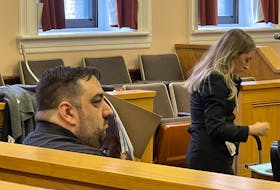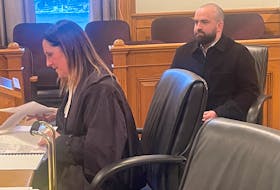A Newfoundland and Labrador Supreme Court judge has rejected an application by a man charged with child pornography offences to exclude evidence at his trial.
Douglas Noseworthy, who will go to trial next week in St. John’s on charges of accessing and possessing child pornography, argued police had breached his rights during his arrest in 2016.
He asked Justice Carl Thompson to throw out statements he had made to police as well as evidence seized as the result of a search warrant on the grounds that the arresting police officer hadn’t immediately allowed him to contact a lawyer.
Police officers had a warrant to search Noseworthy’s home for computer data when they visited him at his place of work on Oct. 6, 2016 and told him that he was under arrest.
Noseworthy told the court the two officers had given him the warrant to search his home, which he read and told police he understood. He testified that one of the officers had read him his rights as she was handcuffing him with his hands behind his back.
Noseworthy told the court during a hearing last week that the officer had advised him that he could speak to a lawyer if he wanted, but he had wondered how he could call one with handcuffs on. He said he had responded “yes” to the questions the officer asked him so he could “have it all over with.”
Noseworthy acknowledged he had not told police he wanted to exercise his right to speak to a lawyer, but said he was dealing with the discomfort of the handcuffs and the shock and shame of being arrested, and was feeling overwhelmed by the seriousness of what was happening at that moment.
Both police officers also testified at the hearing, telling the court Noseworthy had repeated verbatim the information given to him about his rights, confirming he understood.
The arresting officer said she had given Noseworthy the phone number for Legal Aid, but he declined to use it.
The second officer said Noseworthy had appeared calm and had indicated a sense of wanting to accept responsibility for the crimes and of not wanting his wife and children to have any grief.
The court heard Noseworthy had told police officers they would find what they were looking for on his laptop at his home. They did: 61 images of child pornography were later retrieved.
Noseworthy’s lawyer, Mark Gruchy, said the circumstances of his client’s arrest at his place of work, and the fact that he was handcuffed at the time he was read his rights, contributed to him being too overwhelmed to comprehend the information given to him at the time.
Thompson rejected those arguments and dismissed Noseworthy’s application.
“In my view the accused, by his own evidence, has confirmed that he heard the provision of the right and caution,” the judge wrote in his decision. “On the evidence before me, it is clear that this communication took place, was heard and was understood by the accused.
“I do accept that the accused was shocked, distressed and overwhelmed, but I have determined that he both heard and understood the provisions required (by law).”
Twitter: @tara_bradbury









